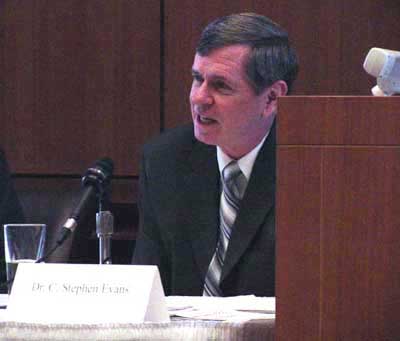Session One - 'University In The Largest Sense Of The Word'

Dr. C. Stephen Evans
by Judy Long
Baylor University faculty members examined "The Baptist and Christian Character of Baylor" during a two-day colloquy April 10-11, honoring Dr. Donald D. Schmeltekopf, provost and vice president for academic affairs, who will retire in May.
The presentations at the Sheila and Walter Umphrey Law Center offered differing perspectives on the various dimensions of Baylor's faith mission and its integration into the teaching, scholarship and service endeavors of the university community. Selected faculty members presented their positions on the session topic, followed by short papers in response and open discussion.
'A University in the Largest Sense of the Word'
The first colloquy session, which was held from 10 a.m. to noon April 10 at the law center, was moderated by Dr. Wallace L. Daniel Jr., dean of the College of Arts and Sciences. As he welcomed participants, Daniel said the session's theme - "A University in the Largest Sense of the Word" - was a subject among the most compelling to a university.
In his opening remarks, Daniel took a moment to recognize some of Donald Schmeltekopf's noteworthy contributions as provost to the evolution of Baylor's mission, including ongoing faculty-wide discussion about the notion of the Christian university. The discussions extended Baylor's mission to include enhanced research and an emphasis on quality graduate education.
"This conversation has taken us beyond what we thought was possible and doable," said Daniel, adding that the colloquy was a celebration encouraging Baylor faculty to raise questions about the school's academic identity and creative spirit.
Dr. C. Stephen Evans, university professor of philosophy and humanities, presented the colloquy's first position paper, "The Christian University and The Connectedness of Knowledge."
Evans argued that the concept of the public university as Christian, as in John Henry Newman's classic book, The Idea of a University, can no longer be defended. A postmodern community must proceed from the assumption that the university is an ideal, he said. Evans asserted the Christian university is the best suited to integrate academic disciplines because it can approach knowledge as a unified whole, not as specialized and fragmented. He described all Christians as sharing a common narrative that defines their faith, but with diverse expressions within the framework of the narrative. Baylor will be able to contribute to the larger academic conversation in a unique role, Evans said.
"Thus, it provides a framework for understanding how the various fields of human knowledge can and should be connected," he added.
Four faculty members responded to Evans's presentation. Dr. James M. Bennighof, professor of music theory, director of academic studies and associate dean for academic affairs in the School of Music, said schools committed to the integration of faith and scholarship can reach conclusions different from those reached in other schools. Integrating faith and scholarship would rule out some false options, thus freeing, rather than limiting, Christian scholarship, he said.
Dr. Marianna Busch, professor and chair of chemistry and biochemistry, said science is a human attempt to observe and interpret the world and cannot replace a need for God. She noted that science disciplines are connected and require an interdisciplinary approach, but she saw no inconsistency with faith.
"The simple man of faith sees God everywhere," she said, stressing the need for Americans to study the physical sciences, contrary to the current trend.
Dr. Gerald B. Cleaver, assistant professor of physics, raised the issue of the university as opposed to the 'multiversity.' A true university holds a world view that envelops knowledge, providing it with meaning and purpose, and the Christian university sees the God of scripture to be the unifying factor, Cleaver said. This world view can generate a path in which theological and scientific knowledge are both regarded as valid.
"Few universities have been able to follow this balanced path; they have tended to diverge either toward scientism or biblicism," he concluded.
The final response came from Dr. M. David Rudd, professor of psychology and neuroscience and director of the doctor of psychology program. Academicians are trained to argue, but Rudd urged listeners not to suspend scientific observation for the sake of argument. He also observed that secular studies in social sciences have become more willing to research topics dealing with the effect of faith on health and challenged the notion that faith cannot inform scientific inquiry. As he concluded his response, Rudd said that Baylor 2012, the university's 10-year vision, is a call for academic excellence and gives Baylor an opportunity to strengthen its character.
Each session was followed by open discussion by all colloquy participants.